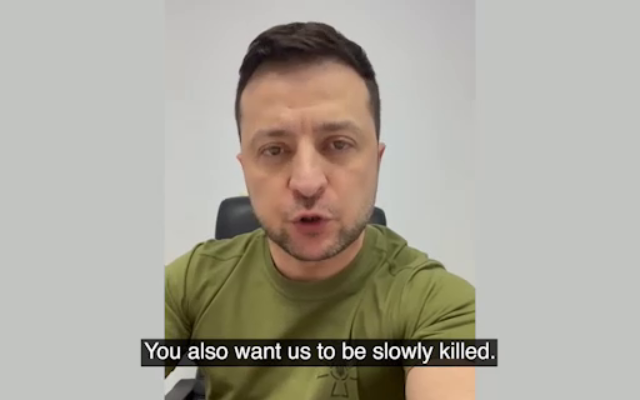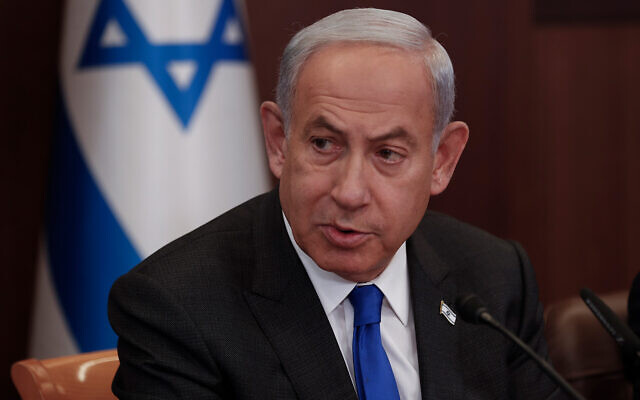Former Prime Minister Naftali Bennett said in a video published on Saturday that Russian President Vladimir Putin assured him in the early days of the war that he would not kill Ukrainian President Volodymyr Zelensky.
“He made me two big concessions,” Bennett said of the meeting with Putin on March 5, 2022, when he flew to moscow in an attempt to mediate shortly after Russia launched its invasion.
“I knew that Zelensky was in danger in a bunker … I said [Putin], ‘Do you intend to kill Zelensky?’ He said, ‘I will not kill Zelensky,'” Bennett said in the interview published on his YouTube channel.
“I need to understand, are you giving me your word that you will not kill Zelensky?” Bennett recalled asking Putin.
Bennett said that the Russian president repeated: “I will not kill Zelensky.”
Bennett said he called the Ukrainian president shortly after his three-hour meeting with Putin and told him, “I just came out of a meeting — [Putin] is not going to kill you. [Zelensky] asked me, ‘Are you sure?’ I said 100 percent. [Putin’s] is not going to kill you.
Bennett recalled: “Two hours later, Zelensky went to his office, and took a selfie in the office, [in which the Ukrainian president said,] ‘I’m not afraid.'”
According to unconfirmed reports, several assassination attempts against Zelensky have been foiled since the start of the invasion of Russia. Those plots are said to have involved the Wagner Group, a security company controlled by Putin aide Yevgeny Prigozhin, as well as mercenaries from Chechen special forces.
According to Bennett, Putin also agreed not to demand Ukraine’s disarmament, and at the end of the same week, Zelensky dropped his push for Ukraine to join NATO. (In September, Zelensky called Russia formally annexed four Moscow-held regions of Ukraine after Kyiv gained fast-track NATO membership).
Bennett also said that “everything I did [in the mediation effort] coordinated with the US.
At the time, the meeting was Putin’s first with a foreign leader since the Russian military invaded Ukraine. Bennett was accompanied on the trip by then-Housing Minister Zeev Elkin, who acted as translator and advisor.

Ukraine’s President Volodymyr Zelensky in a video address posted on Telegram on March 6, 2022. (screenshot)
Bennett, Israel’s first Orthodox premier, flew to Moscow on Shabbat, which Jewish Jews are prohibited from doing under Jewish law, although exceptions are made for medical or security situations in which life is at risk. Elkin is also religious.
Meanwhile, as the invasion approaches its first anniversary, reports in Axios indicated that the new government led by Prime Minister Benjamin Netanyahu is organizing a policy review On your position towards the war.
The report added that a growing number of defense and intelligence officials want Jerusalem to help Kyiv militarily without creating divisions with Moscow, such as through indirect transfers of Israeli-made systems.
It was not clear which weapons were under consideration, but the official said the policy review was unlikely to result in any significant changes and stressed that Israel would not send missile defense systems, as Kyiv has lobbied.
Netanyahu hinted at a possible policy shift in an interview with CNN that aired on Tuesday, claiming he was providing “other kinds of aid” to Kyiv besides humanitarian aid, citing Israel’s “complex” relationship with Russia. relations” and “freedom of action” in Syria in an effort to “keep Iran under control” amid concern over the need to maintain it. After the interview, Russia warned Israel against arming Ukraine.

Prime Minister Benjamin Netanyahu attends the weekly cabinet meeting in Jerusalem on January 3, 2023. (Pool Photo via Atef Safadi/AP, File)
The warning from Moscow also follows reports in recent weeks that Israel has rejected a US request to hand over 10 Hawk anti-aircraft batteries and hundreds of interceptor missiles for delivery to Ukraine.
However, The New York Times reported last month that the US military was quietly shipping hundreds of thousands of artillery shells to Ukraine from a massive stockpile stored in Israel.
Israel has sought to maintain a neutral stance on the war, keeping channels open with both Russia and Ukraine. Israel has refused to provide arms to Kyiv for fear of angering Moscow, concerned that doing so would jeopardize its decade-long campaign to contain Iranian incursions along its northern border in Syria. Russia, which has advanced air defenses in Syria, largely refrained from intervening in Israeli airstrikes.
The issue has strained relations between Jerusalem and Kyiv, as Ukrainians continue to pressure Israel to provide more defense aid.
AFP contributed to this report.
